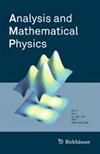涉及两个Hardy算子的加权不等式
IF 1.6
3区 数学
Q1 MATHEMATICS
引用次数: 0
摘要
我们找到了权值\(u_1, u_2, v_1, v_2\)的充分必要条件,即在(a, b)上可测量的,正的,有限的,a.e.,对于它们存在一个正常数C,使得对于给定的\(0< p_1,q_1,p_2,q_2 <\infty \),不等式$$\begin{aligned} \begin{aligned}&\bigg (\int _a^b \bigg (\int _a^t f(s)^{p_2} v_2(s)^{p_2} ds\bigg )^{\frac{q_2}{p_2}} u_2(t)^{q_2} dt \bigg )^{\frac{1}{q_2}}\\&\quad \le C \bigg (\int _a^b \bigg (\int _a^t f(s)^{p_1} v_1(s)^{p_1} ds\bigg )^{\frac{q_1}{p_1}} u_1(t)^{q_1} dt \bigg )^{\frac{1}{q_1}} \end{aligned} \end{aligned}$$对于每一个非负的,可测量的函数f在(a, b)上成立,其中\(0 \le a <b \le \infty \)。证明是基于最近发展的离散化方法,使我们能够克服早期结果的限制。本文章由计算机程序翻译,如有差异,请以英文原文为准。
Weighted inequalities involving two Hardy operators
We find necessary and sufficient conditions on weights \(u_1, u_2, v_1, v_2\), i.e. measurable, positive, and finite, a.e. on (a, b), for which there exists a positive constant C such that for given \(0< p_1,q_1,p_2,q_2 <\infty \) the inequality
$$\begin{aligned} \begin{aligned}&\bigg (\int _a^b \bigg (\int _a^t f(s)^{p_2} v_2(s)^{p_2} ds\bigg )^{\frac{q_2}{p_2}} u_2(t)^{q_2} dt \bigg )^{\frac{1}{q_2}}\\&\quad \le C \bigg (\int _a^b \bigg (\int _a^t f(s)^{p_1} v_1(s)^{p_1} ds\bigg )^{\frac{q_1}{p_1}} u_1(t)^{q_1} dt \bigg )^{\frac{1}{q_1}} \end{aligned} \end{aligned}$$
holds for every non-negative, measurable function f on (a, b), where \(0 \le a <b \le \infty \). The proof is based on a recently developed discretization method that enables us to overcome the restrictions of the earlier results.
求助全文
通过发布文献求助,成功后即可免费获取论文全文。
去求助
来源期刊

Analysis and Mathematical Physics
MATHEMATICS, APPLIED-MATHEMATICS
CiteScore
2.70
自引率
0.00%
发文量
122
期刊介绍:
Analysis and Mathematical Physics (AMP) publishes current research results as well as selected high-quality survey articles in real, complex, harmonic; and geometric analysis originating and or having applications in mathematical physics. The journal promotes dialog among specialists in these areas.
 求助内容:
求助内容: 应助结果提醒方式:
应助结果提醒方式:


